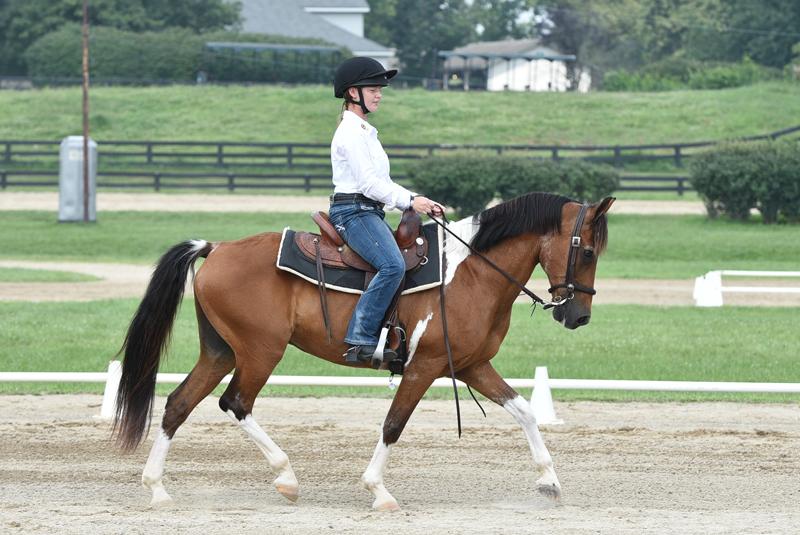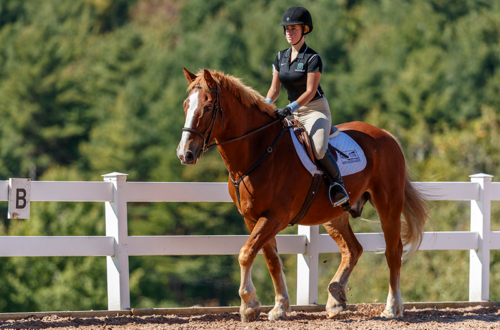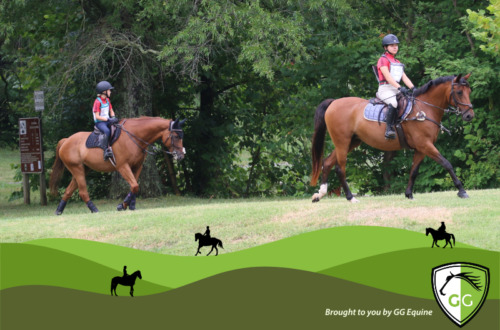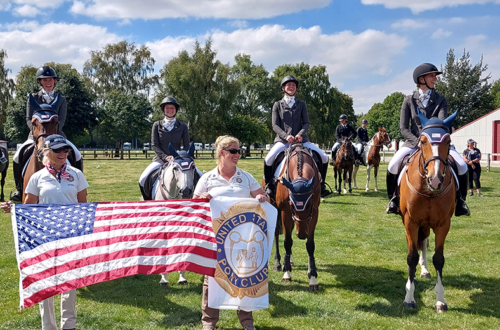
The United States Pony Clubs Adds New Western Dressage Certification Track
May 23, 2024 (Lexington, KY) — In response to the popularity and growth of Western Dressage, The United States Pony Clubs, Inc. has added a new Western Dressage certification track. The new track allows riders interested in Western Dressage to specialize in this discipline and earn certifications starting at the beginner level (D-2) and progressing up to the intermediate level (C-2). Soon, USPC hopes to add more advanced levels (also called national-level certifications) to Western Dressage, from C-3 through the advanced A level. The USPC Western Dressage certification track aligns with the Dressage track while reflecting the Western Dressage Association of America’s (WDAA) test expectations.
“Western Dressage is very accessible for riders of all ages and all types of mounts, which makes this an exciting opportunity for Pony Club,” said USPC Instruction Services Director Connie Jehlik. “Many of us grew up riding Western and switched to English or vice versa, and the ability to learn or compete in either discipline in Pony Club gives our members options, which we are thrilled about.”
In 2012, USPC added a general Western certification track at the D-2 through C-2 levels (beginning through intermediate). This was originally geared towards Western Trail, Western Riding, and Reining. Over time, this track has remained the same except for the removal of references to Reining.
USPC President Jennifer Sweet was on the Board of Governors when the Western certification track was first introduced and is pleased to see the current evolution of the Western Dressage track. “USPC would like to share our mounted, safety, and horse-care education along with the life lessons that we teach equestrians from all disciplines,” said Sweet. “Western Dressage feels like the perfect way to do that!”
In 2022, Jehlik, along with the help of Wayne Quarles, a USPC National Examiner and past USPC Activities Director, created the first draft of the Standards of Proficiency for the Western Dressage track. “Wayne had helped to develop the first Western Dressage rulebook as USPC added this discipline as a competition option for our membership,” said Jehlik.
The second and third drafts for the Western Dressage Standards of Proficiency were revised by USEF “R” Dressage judge Susan Posner, who also judges Western Dressage, and by USPC National Examiner Anne Moss, who is also a USEF “R” Dressage judge, Western Dressage judge, and a Sport Horse judge.
“This is a fantastic sport,” said Moss during her presentation at the annual USPC National Examiners Virtual Seminar. “It’s an entry point for anyone at any age on any horse, and I just think that is very exciting.”
Western Dressage is accessible to any horse breed and all types of riders, and it would be easy for anyone already doing Dressage to cross over into Western Dressage. “If you have a talented Dressage horse/rider combination, if their horse is willing to go in western tack…then there’s a huge opportunity for a lot of people to cross over into that sport quite easily and be quite successful…and you get a fun outfit,” added Moss.
Over the last decade, Western Dressage has grown as a competitive discipline within Pony Club at regional rallies and USPC Championships. Members who are eligible and meet the requirements may go on to compete in Western Dressage at USPC Championships, held every two years at the USPC Festival. And in 2025, new virtual competitions will be available for Pony Club members in Western Dressage and other disciplines.
For anyone interested in getting a certification in Western Dressage who is not yet a member of the United States Pony Clubs, click here (or find Participating Memberships under the Join menu on www.ponyclub.org). To learn more about getting started in Western Dressage with Pony Club, visit https://issuu.com/usponyclubs/docs/us_pony_club_spring_2024_digital_-_final/14.
For those current Pony Club members interested in starting down the Western Dressage track, talk to your District Commissioner or Center Administrator and you can find the USPC Western Dressage rulebook online. The Western Dressage Standards of Proficiency can be found after logging into your USPC profile at www.ponyclub.org under the Education menu.
About The United States Pony Clubs, Inc. — The United States Pony Clubs, Inc. (USPC or Pony Club) is a 501(c)(3) nonprofit educational organization that builds the foundation of teamwork and sportsmanship through riding, mounted sports, and care of horses and ponies, while developing and enhancing leadership, confidence, responsibility, and a sense of community in its youth and adult members. USPC is proud to offer instruction and competitive opportunities in 11 competitive disciplines through hundreds of clubs and centers across the United States. USPC’s educational standards continue to be instrumental in curriculum development for schools, universities, equestrian professionals, and organizations across the United States. Many of the nation’s top equestrians, including Olympic team members, as well as successful business professionals and leaders in a variety of fields, have roots in Pony Club. For more information, please visit www.ponyclub.org.





